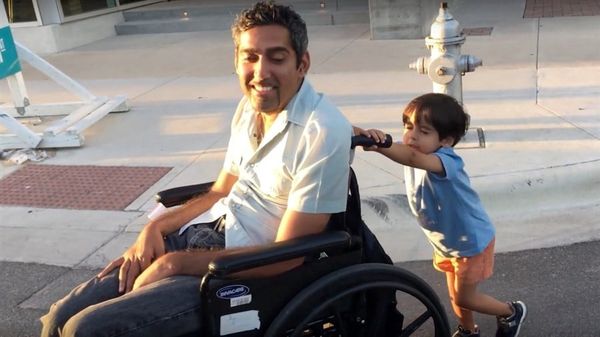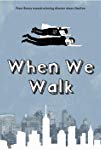Eye For Film >> Movies >> When We Walk (2019) Film Review
When We Walk
Reviewed by: Jennie Kermode

Back in 2013, shortly after his diagnosis with multiple sclerosis, director Jason DaSilva made the documentary When I Walk to chart his experience of learning to live with the disease, appreciate the privileges he still had and find new ways of engaging with life on his own terms. Six years later this follow-up film looks at the impact of bringing a child into that life, and at what happens when his wife decides that she can no longer cope with their restricted way of living and moves to Texas, taking their son with her.
There has been much more insightful stuff written on the impact of disability in relationships than you'll find here, but Jason's approach to his situation is one that many viewers will identify with and the fact that he's slowly learning throughout the years over which the film is shot means that the audience can go on this journey with him. Ultimately Jason is just an ordinary guy, screwing up in ordinary ways even though the difficulties he's faced with are relatively rare. This should make it easier for viewers who are not themselves ill or disabled simply to connect with him as a person.

Although he's a person who clearly loves his family, Jason doesn't always seem to grasp what's going on with them or take up his share of the emotional work needed to resolve their problems. It's to his credit that he includes material in the film that he must have seen in a different light by the time of the final edit. The result is a portrait of his life that feels raw and honest. Some subjects - like sex and the arguments that inevitably took place around the separation - are touched on only briefly and with caution, but that's partly because the film is made for - and addressed to - Jason's son. The particular form of multiple sclerosis that Jason has is aggressive and he doesn't know how long he'll live, so needs to tell his story now, not knowing how old the boy might be when it becomes their last means of communication.
The additional complexity of a life whose length is more than usually difficult to predict is just one of the interesting issues that the film touches on adjacent to its main story. We also get an insight into the day to day care that Jason receives, some of which looks very uncomfortable but may actually be easier for him to cope with due to damage to his nerves. We see the difficulty of depending financially on supported housing, which tends to be small, when also having to make room for large pieces of disability-related equipment. We also see the way that living within a federal system impacts disabled people. The level of care that Jason is entitled to as a resident on New York will make many disabled UK viewers envious, but there's a stark contrast with Texas, where he just wouldn't be ale to get what he needs to stay alive, effectively preventing him from moving closer to his son.
Some issues are skirted over or ignored - it's difficult to believe that Jason's plane journeys to see his son are as easily managed and low on complications as they seem - but obviously not everything can be covered in just 78 minutes. Furthermore, this isn't a how to guide for coping with illness, and it's pleasingly free of tragic sentiment - it is much more a story about fatherhood and the importance of finding ways to connect no matter what obstacles intrude. We see enough of the boy to understand that sometimes what he wants is not the same as what his father wants, and we also see him grow from an infant completely oblivious to the camera to a five year old who is - quite literally - ready to call the shots. It will be interesting to see what he has to say when he's ready to make a film of his own.
Reviewed on: 12 Jun 2019















